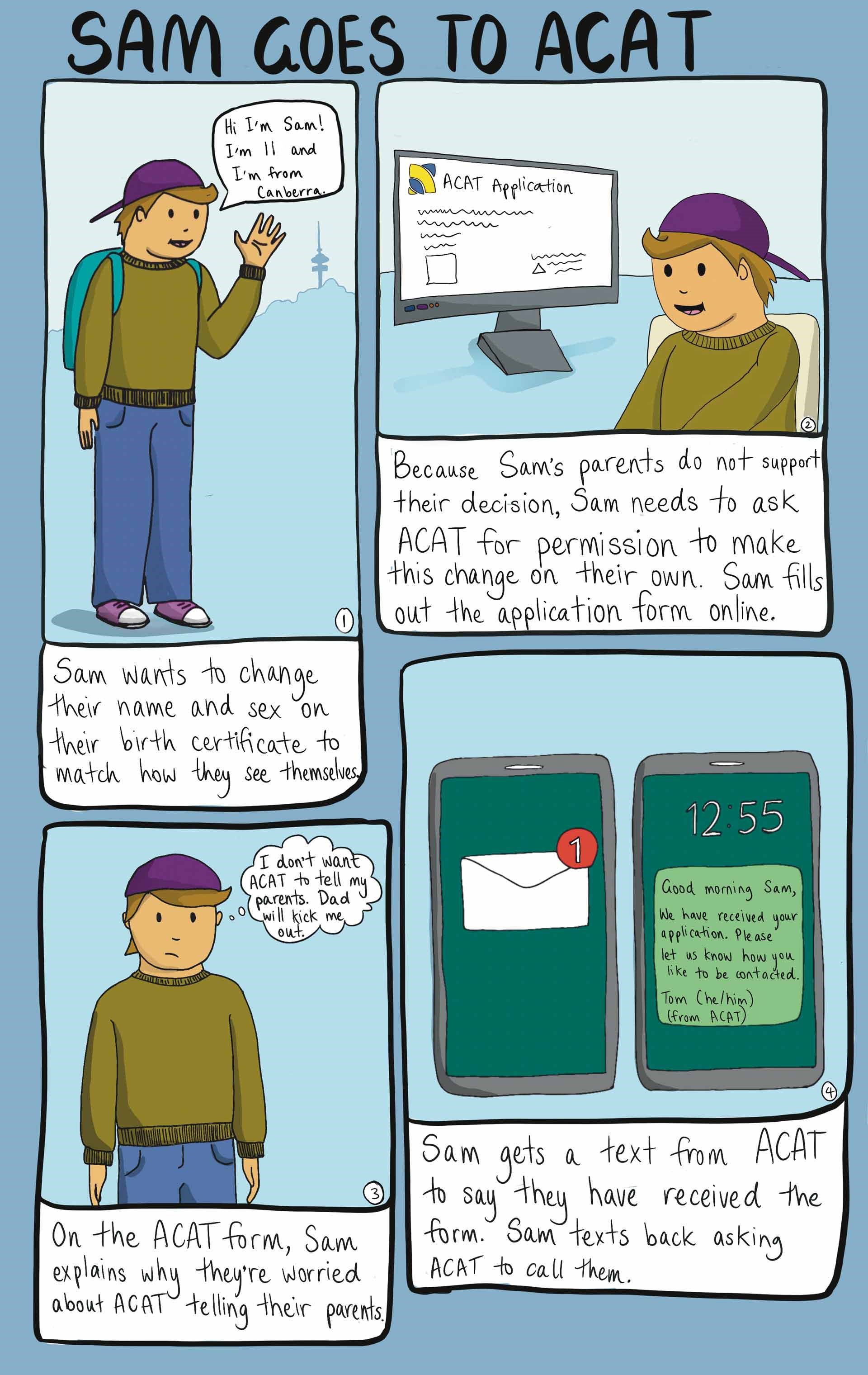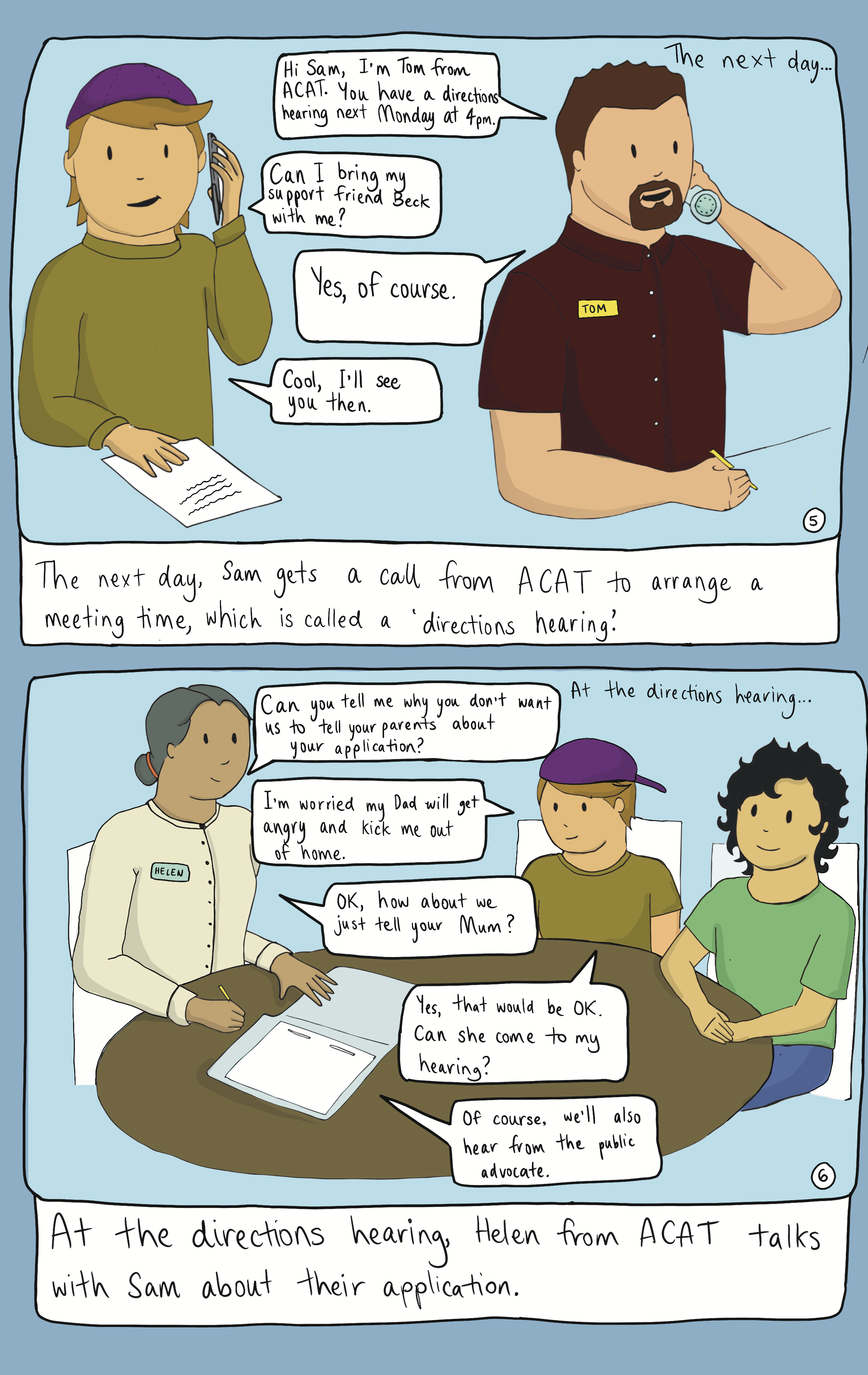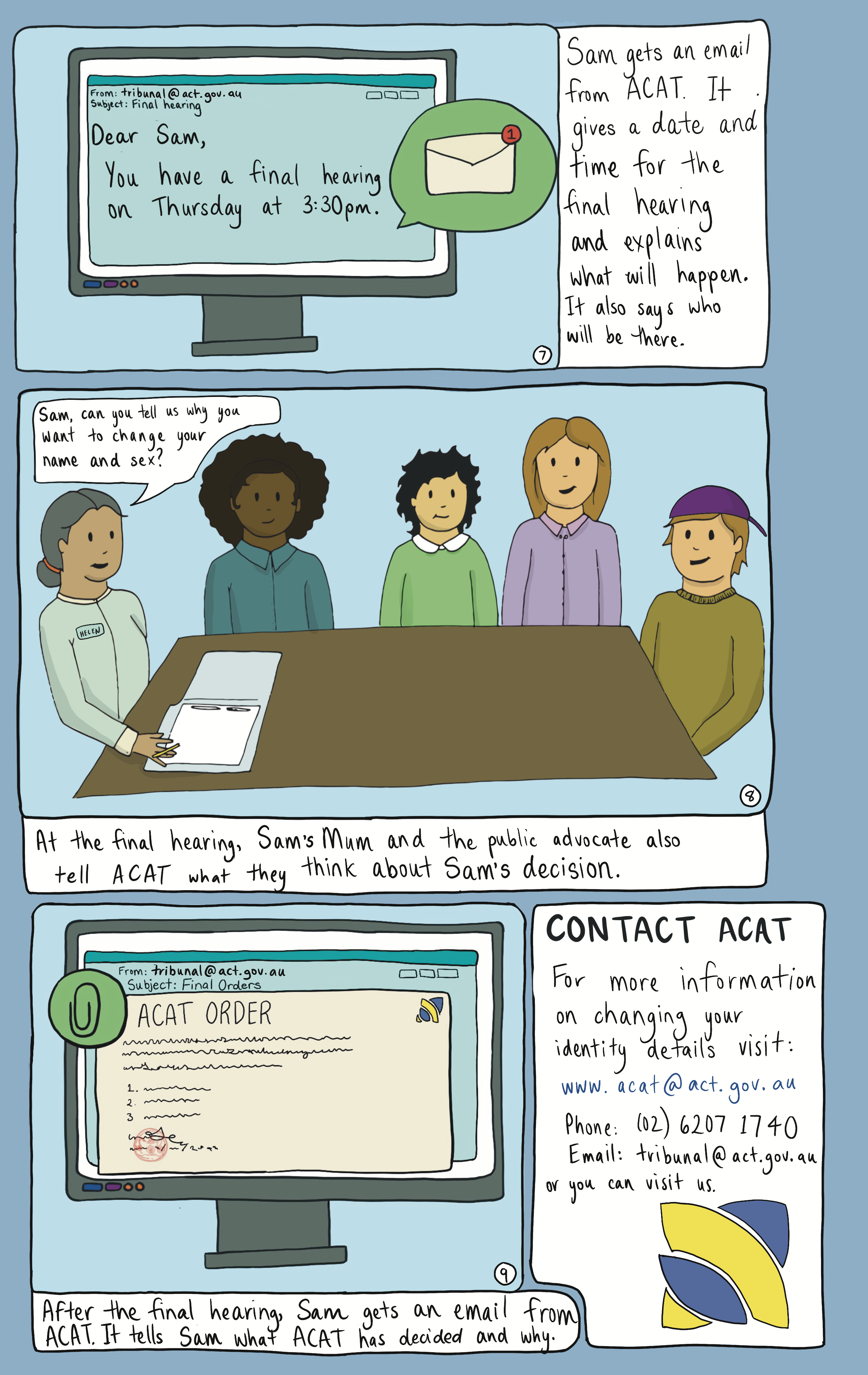Change of identity details for young people
If you are under 14 years old, you can apply to ACAT for permission to apply to change your identity details at Access Canberra.
You may want to:
- change your given name on your birth certificate
- change your sex on your birth certificate
- apply for a Recognised Detail Certificate
More information about changing your identity details is on the Access Canberra website.
Before you apply
Information you may need
Start thinking about what documents you can use to support your application.
You may need:
- a copy of your birth certificate
- proof that you live in the ACT (such as mail from Medicare)
- your school student card
- a letter from your doctor or psychologist
- a statement from your family and/or friends about your gender identity.
You do not need to have all these documents ready when you apply.
Is there a fee?
You do not have to pay a fee when you apply to ACAT. Other services at ACAT, such as photocopying documents, are also free for this type of application.
How to apply
You need to fill in an online or printed version of the application form. You can get someone to help you complete the form.
Submit the online form or fill in and print the Application to Change Registered Identity Details [PDF 257KB] and give the printed version to ACAT in person, by email or post – see our contact details.
Tell us on the form how we can contact you. After we receive your application ACAT will contact you to tell you about the next steps.
Having a representative
You can have a representative who helps you with your application, such as a parent or someone from the Youth Law Centre. A representative can speak for you and on your behalf receive the information ACAT sends you. Tell ACAT as early as possible if you have a representative.
Representing a young person
If you are making an application on behalf of a young person, or are representing a young person, you must give us evidence that you are authorised to do so (such as birth certificate or court order). Give this evidence to ACAT.
If you are making this application as a litigation guardian for a young person, fill in and give to ACAT an Affidavit for a person to act as a litigation guardian[PDF 39KB] and Consent and undertaking by a person to act as litigation guardian[PDF 37KB].
Telling your parents
By law, ACAT must tell your parent/s, or each person with parental responsibility for you, about your application. ACAT may give a copy of your application form and any documents to your parent/s.
If you think you will be badly affected, you can tell us if:
- you do not want your parent/s to know about your application
- you do not want your parent/s to get a copy of your application
- you do not want your parent/s to get some of the information in or attached to your application.
You can tell us about this on your application form. ACAT will then decide what, if any, information to tell or to give your parent/s. ACAT will always tell you and give you a chance to stop your application before we tell or give your parent/s any information about your application.
ACAT will not tell people about your application if it poses a risk to you or another person’s health and safety.
After you apply
We will arrange a time to talk with you about your application (we call this a hearing). We want to make it as easy and comfortable for you, so tell us what suits you. For your hearing, you can either:
- come into the ACAT office (and bring a support person if you wish)
- talk to us on the phone
- talk to us via a video call
- have a representative speak for you.
ACAT will send you a letter, email or text message to tell you the date, time and location of your hearing.
Hearings are in private. Your name won’t be made public and the public cannot attend the hearing. Only people that the ACAT member allows can be at the hearing. This includes you, your representative (if you have one), your support person (if you have one, such as a friend or family member), the Public Advocate, and may include your parent/s or person/s with parental responsibility.
ACAT may speak to your parent/s, or person with parental responsibility, to ask what they think about your decision. You do not have to be in the room when ACAT speaks to other people, but you can be if you wish.
Public Advocate
ACAT will give the Public Advocate a copy of your application form, and any information or documents you give to ACAT. The Public Advocate is someone from the ACT Human Rights Commission who supports people.
The Public Advocate is there to protect and stand up for your rights and interests. The Public Advocate will speak up and encourage you to participate during the decision-making.
Attending ACAT
You can tell us if you need help at the hearing. Let us know before the hearing if you need to use a hearing loop or an interpreter and we can organise one for you.
Find out more about accessibility and coming to ACAT.
Making a decision
If ACAT is satisfied that you understand the meaning of the change you want made and that you believe the change better reflects your gender identity, then ACAT must give you permission apply to Access Canberra.
If ACAT gives you permission, you will get a letter from us. You can then use this letter to apply to Access Canberra.
Where to go for help
If you need help or you want to talk to someone about your application, there are people who can help. You should not feel like you have to do this by yourself.
You can contact us or these organisations:
Legal Aid – Youth Law Centre
Free legal services for young people aged 12–25. Contact them for support with the ACAT process.
See the Youth Law Centre website for more information and contact details.
A Gender Agenda
Social support for intersex, trans and gender diverse young people in the ACT. Contact them if you have any questions.
See the A Gender Agenda | Trans, Intersex & Gender Diverse services Canberra website for more information and contact details.
Bit Bent
An all-inclusive social support group for gender and sexually diverse young people run out of the Belconnen Youth Center. Contact them if you have any questions.
See the Bit Bent Facebook page for more information and contact details.
Kids Helpline
A free (even from a mobile), confidential 24/7 online and phone counselling service for young people aged 5–25. Contact them for practical help and emotional support if you need someone to listen.
See Kids Helpline website for more information and contact details.
Access Canberra (Births, Deaths and Marriages)
Contact Access Canberra to ask questions about its application process.
See Change of name registration website for more information and contact details.
More information
Find out about:



ACT Civil and Administrative TribunalA tribunal established under the ACT Civil and Administrative Tribunal Act 2008. It may also be referred to as ACAT or Tribunal.
Adjourn (or adjournment)To suspend or postpone a preliminary conference, mediation or hearing and reschedule it for a future date.
Administrative reviewACAT has jurisdiction to review some administrative decisions made by the ACT Government. Find out about Review of ACT Government decisions.
Alternative dispute resolution (ADR)Also known as dispute resolution. This is a way of resolving disputes without a formal hearing. It may involve a preliminary conference or mediation. ADR is used to help parties resolve cases by agreement.
AnorMeans ‘and another’. This term is generally used to name parties to proceedings when there is more than one applicant or respondent.
Appeal TribunalA tribunal constituted under section 81 of the ACT Civil and Administrative Tribunal 2008 to review a decision of the tribunal (not all ACAT decisions are appealable at ACAT – you may need to go to the Supreme Court).
AppellantThe individual or company that appeals an ACAT decision.
ApplicantThe individual or company that brings a case to ACAT, usually by making an application.
Authorising lawsA law that says an application (including referrals) may be made to ACAT. An authorising law may also set out the powers ACAT has in a case. Also see ‘jurisdiction’.
Calling a witnessA party or their representative will ‘call a witness’ at an ACAT hearing when they ask a witness to give evidence.
CaseAlso known as a matter, dispute, application or referral. Cases come to ACAT when ACAT has jurisdiction (power) to make a decision.
Cross-examinationThe process of asking a witness questions to test or check the evidence that the witness has given to ACAT.
DecisionWhat the tribunal decides or determines about an issue or a dispute. The tribunal may sometimes explain why in a statement of reasons.
Defined benefitsare the following benefits (see section 33 of the MAI Act):
- income replacement benefits;
- treatment and care benefits;
- quality of life benefits;
- death benefits;
- funeral benefits.
Deliver a decisionAlso ‘handing down a decision’. This is giving a decision about an ACAT case. It may be done verbally or in writing (or both).
DirectionsInstructions that set out what each party must do (and when), often to prepare a case for hearing.
Directions hearingA short hearing where an ACAT Member or Registrar decides how to manage a case and what needs to be done before a hearing. Find out about directions hearings.
Ex parte orderAn order made by ACAT where one or more parties were not present.
Expert reportA written report from an expert that may be used as evidence.
Expert witnessA person with specialised knowledge based on their training, study or experience. An expert can give evidence at a hearing. Find out more about witness statements.
Final directions hearingSometimes ACAT will hold a final directions hearing prior to the final hearing of an application. The purpose is to make sure the case is ready to go to a hearing and give the parties a chance to ask questions about the hearing process.
GuardianA guardian is a person ACAT appoints to make personal decisions, about health, welfare and where a person lives, for a person who has impaired decision-making ability (the ‘protected person’).
Handed upGiving documents to an ACAT Member or Registrar in a hearing.
In chambersWhen ACAT considers something without holding a hearing.
Joined party (joined/joinder)A party who was not originally a party to the dispute but has later been added to the case.
JurisdictionACAT’s authority (power) to deal with, hear and decide applications (cases).
LeaveIf someone asks for leave, they are usually asking for permission to do something.
List (or listing)A schedule (or list) of cases to be heard at ACAT each day.
Listing noticeA letter or written document from ACAT that sets out when a conference, mediation or hearing is scheduled at ACAT.
ManagerA manager is a person ACAT appoints to make decisions, about property and money, for a person with impaired decision-making ability (the ‘protected person’).
MAI ActMotor Accident Injuries Act 2019 (ACT).
MediationA private meeting where parties discuss ways to resolve their dispute, with the help of an impartial mediator (who is also an ACAT Member or Registrar). It is held under section 35 of the ACT Civil and Administrative Tribunal Act 2008.
Non-publication and/or non-disclosure orderAlso called a ‘suppression order’. It is an order that requires certain information not to be published or disclosed. It is made under section 39 of the ACT Civil and Administrative Tribunal Act 2008. Find out about public hearings and confidentiality.
Notice to partiesA letter sent to the parties in a case that sets out the time, date and location for an ACAT conference, mediation or hearing.
Opening statementUsually means a statement made at the beginning of a hearing to outline the key points in the case. Sometimes parties are asked to give an opening statement at a mediation or preliminary conference.
OrderA direction or instruction of the tribunal that a person do a certain thing. The tribunal can make different types of orders depending on the case type and the tribunal’s powers in a case or dispute.
Originating applicationAn application that starts an ACAT case.
Party or partiesAn individual or company directly involved in an ACAT case, for example an applicant or respondent. Find out how to identify and name parties.
Preliminary conferenceA private meeting where parties discuss ways to resolve their dispute with the help of an ACAT Member or Registrar. See section 33 of the ACT Civil and Administrative Tribunal Act 2008. ACAT has different types of preliminary conferences.
Protected personA person who has impaired decision-making ability and about whom an application to ACAT may be made seeking orders under the Guardianship and Management of Property Act 1991 or the Power of Attorney Act 2006.
RegistryThe administrative section of ACAT that accepts documents lodged by parties, handles enquiries and provides support for case management.
Relevant insurerfor a motor accident, means the insurer under the Motor Accident Injuries Act 2019 (see section 34) of the motor vehicle considered to be at fault for the motor accident in the ACT.
RepresentativeA person who represents or advocates for an individual or company at a conference, mediation or hearing at ACAT. For example, a legal practitioner or an attorney appointed under a general power of attorney.
Reserved decisionWhen an ACAT Member or Registrar reserves a decision (at the end of a hearing), this means they will give their decision later, either verbally or in writing (sometimes both).
RespondentThe party (or parties) against whom orders or relief is sought.
Serve/serviceA person who can give evidence at a hearing. Find out about witness statements.
Short service orderAn order that authorises a shorter time for service (than the time otherwise required).
Significant occupational impact (SOI)Significant impact on an injured person’s ability to undertake employment.
Statement of reasonsA document that explains why ACAT made an order in a case. It sets out the law relied on by an ACAT Member or Registrar and explains how the law was applied to the facts of the case. You can request a written statement of reasons within 14 days after an order is made. Find out about statement of reasons.
StayAn order for a particular action (or decision) to be put on hold or suspended for a period of time.
SubmissionA document that sets out your side of a case or dispute and the relevant law. It is presented to ACAT either in writing, verbally or both. Find out about submissions.
SubpoenaRequires a person to appear at ACAT to give evidence or provide documents (or both). Find out about subpoenas.
Substituted service orderAn order that says how a party is to be served with an application or other documents related to the proceedings. In a civil dispute or a rental dispute, an applicant will need to consider asking for a substituted service order if they do not have a physical address for the respondent. Find out about lodging and serving documents.
WitnessA person who can give evidence at a hearing. Find out about witness statements.
